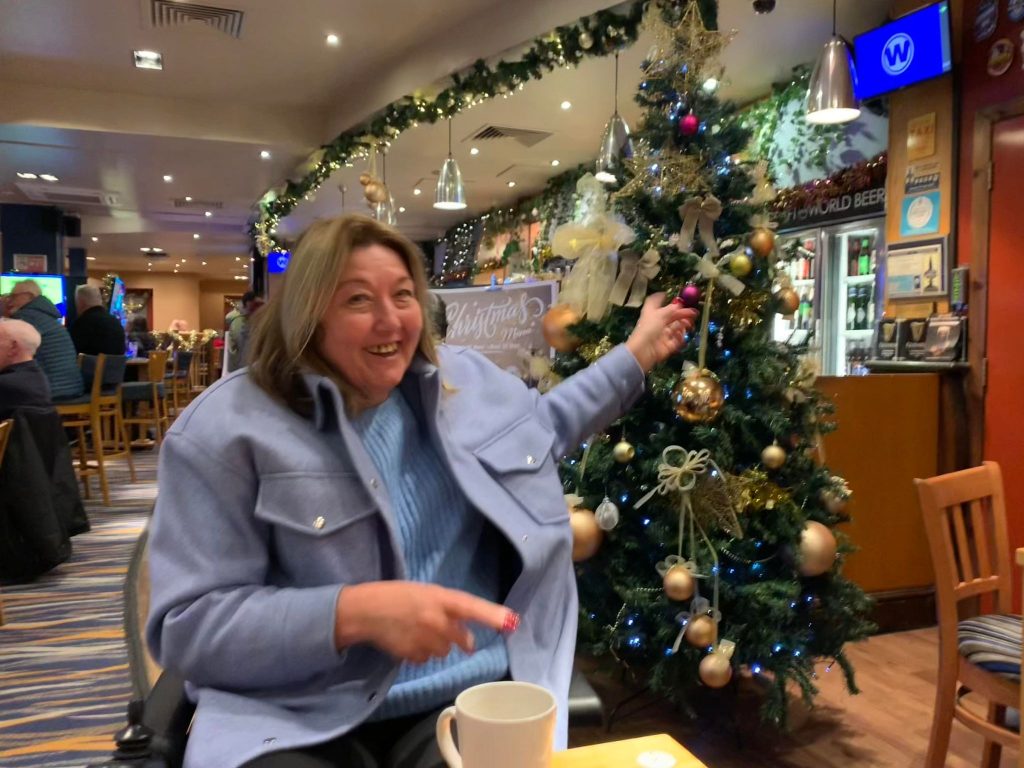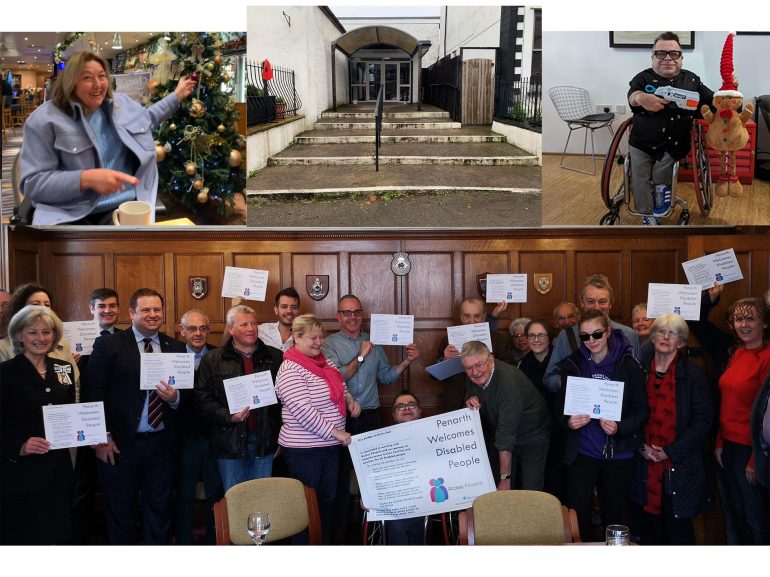Poppy seller had to get into Ex-servicemen’s Club via cellar — and use the toilet in a nearby pub
LAWS were introduced in 1995 and 2010 to make it easier for disabled people to access pubs and shops, yet 13 years later wheelchair users in Penarth, and across Wales, still face problems.
Jon Luxton, a former mayor of Penarth, is a disability equality specialist advisor to the Welsh Government and has been fighting for the rights of disabled people since he was 13. He is now 59.
“People with impairments are made disabled by how they are treated by society.
Jon Luxton, Welsh Government advisor

He explained that the social model of disability, which is enshrined in the Equality Act 2010, states that society places physical, value-based and social barriers on disabled people, which makes society inaccessible to them.
Jon Luxton adds some humour to a serious subject by assassinating a gingerbread man.
“People with impairments are made disabled by how they are treated by society. Through its non-inclusive environment, structures, values and attitudes, people with impairments are marginalised, and so made disabled,” said Mr Luxton, who was mayor of Penarth in 2018.
So what are the problems?

Ruth Jackson has been a wheelchair user since 1993 and has lived in Penarth for over 40 years.
“People are very, very good and very helpful, but if the infrastructure is not there, then there’s nothing they can do,” she said.
Ms Jackson volunteered at the British Legion Poppy Appeal but had a difficult time joining the event on Remembrance Sunday because of a lack of disabled access.
“People are very, very good and very helpful, but if the infrastructure is not there, then there’s nothing they can do.
Ruth Jackson, Penarth resident for over 40 years
The event on Remembrance Sunday was held at the Ex-Servicemen’s Club in Penarth, which has no ramp access and no disabled facilities. Ruth eventually joined via a route through the cellar, but still had to go up the road to the Bears Head pub to use their toilet.
The Ex-Servicemen’s website reads: “We pride ourselves on providing a friendly and welcoming atmosphere for all.”’
Ruth is a member of the Ex’s and said that the management are looking to improve the accessibility when they have the funds. The Ex’s is one of several bars or shops along the Penarth High Street that do not appear to have obvious disabled access.
Club secretary, Ian Teagle said: “We currently do not have sufficient funding to install the toilets, but are gradually saving to be able to do this.”
“The shops don’t realise that when (shops in Penarth) they don’t follow building regulations, they are creating disabled people,” said Mr Luxton.
The shops don’t realise that when they don’t follow building regulations, they are creating disabled people.
Jon Luxton
Ms Jackson said her biggest struggle with access in Penarth was the lack of dropped kerbs.
“Here in the town centre it’s wonderful but once you get past the chemist on Stanwell Road it’s horrendous,” she said.
Using a walkable area in the centre of Penarth (the black line), this is a map of the functional dropped kerbs in the area. The data shows a high amount in the town centre, and far fewer beyond it.
This means that on long roads leading out of the centre there is less opportunity to cross the road, forcing wheelchair users to take a longer route.
Near traffic lights or schools there are enough, but in residential areas around them they are very limited.
Three weeks ago The Cardiffian asked Vale Council for comment and an explanation on how decisions were made on installing dropped kerbs but has received no answer.
They’ve never prioritised disability access in any way outside of their legal requirements.
Jon, on councils
“They just don’t care,” said Mr Luxton, who believes sorting out dropped kerbs should be simple, but there would need to be a proper willingness and serious focus from local government to make any real changes.
“They’ve triaged what they think is important, and they’ve never prioritised disability access in any way outside of their legal requirements,” he added.
Access Penarth was set up to improve matters. Mr Luxton said it was potentially a great scheme with a good group of people trying to make it work but that Covid had killed it and Penarth Town Council did not appear to be interested in its progress.
Ms Jackson had not heard of the group.
Access Penarth’s Twitter bio reads: “Working to make Penarth a disability-friendly town.” It launched in April 2019, with MP Stephen Doughty, Mr Luxton and other councillors present. Its last online activity was in July 2019.
Penarth Council said Councillor Richard Cox was in charge of the campaign. Councillor Cox said Penarth Youth Action group was handling it. The group said it was never its responsibility.
Councillor Cox said: “I was very concerned at the response you had from Penarth Youth Action, and have started asking some detailed questions.”
The Equality Act
The 2010 Equality Act requires all organisations to make “reasonable adjustments” to ensure that they don’t discriminate against disabled people.
Mr Luxton believes this term is vague and allows businesses to continue to offer the bare minimum or simply just ignore the law.
“Other forms of discrimination that are outlawed in the Equality Act have none of those kinds of caveats,” he said.
Beyond the legislation, forcing change is difficult.
The Welsh Government website says 28% of people in Wales live with some form of impairment, so not making businesses accessible to them reduces the number of potential customers.
We’re a big market, the purple pound, and we’re big drinkers because we can’t fall over!
Ruth Jackson
“We’re a big market, the purple pound, and we’re big drinkers because we can’t fall over!” said Ms Jackson.
What is being done?
The Welsh Government has acknowledged that disabled people were disproportionately affected by lockdown and commissioned a study, which became the Locked-Out Report.
No other government I can think of has opened itself up like this and said tell us what we’re doing wrong.
Jon Luxton
The report found that the social model had been pushed aside too easily because it had not been properly embedded in government and public services. This led to the Welsh Government creating the Disability Rights Taskforce.
“It’s unlike anything in the world, no other government I can think of has opened itself up like this and said ‘tell us what we’re doing wrong’,” said Mr Luxton, who helped create the taskforce, and now acts as an advisor.
What still needs doing?
When a business closes, any new trader applying for planning permission for a change of use must include an access statement.
Mr Luxton believes this system is not fit for purpose as councils do not force the businesses to improve access. However, if used correctly, the system could deliver real change.
“The councils are fully aware of their legal obligations and the existing guidance regarding the implementation of building regulations and equality law, and yet they still avoid their responsibilities,” he said.
The work the Welsh government has put in place is wide-ranging and, in Mr Luxton’s opinion, groundbreaking. However, change has to be implemented at a local level.
A key issue here is whether the Welsh Government’s budget would prioritise funding to assist businesses and councils to make those changes.

Q: “The council are on the phone, and they will do whatever you want, what do you say?”
A: “Look where dropped kerbs are desperately needed and please make sure that where there are already kerbs, they’re not flooded,” Ruth Jackson
Q: “Does it feel difficult to keep campaigning, after so long, when there’s still so much to do?”
A: “While I still feel like we’re winning, or succeeding, I’m not going to stop,” Jon Luxton




